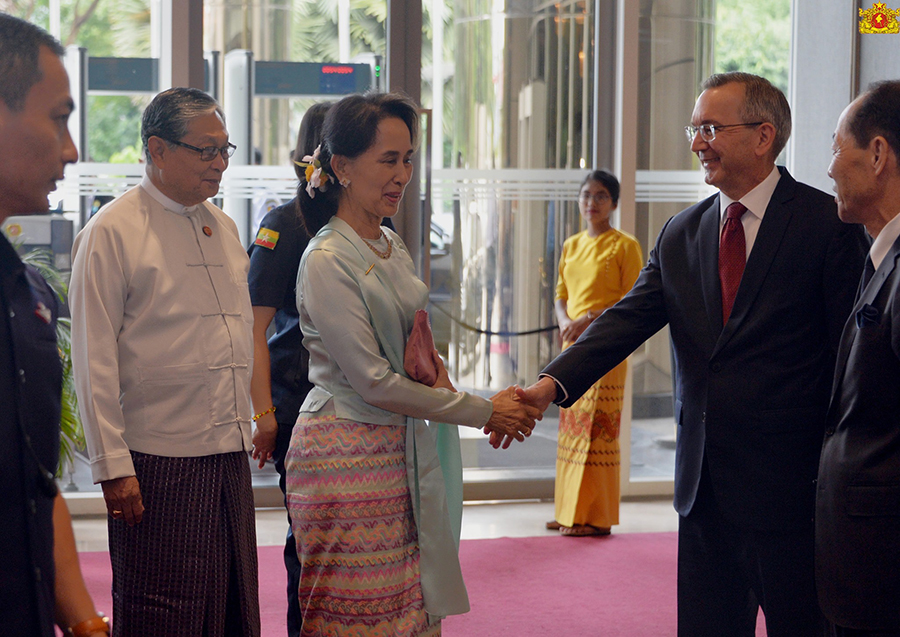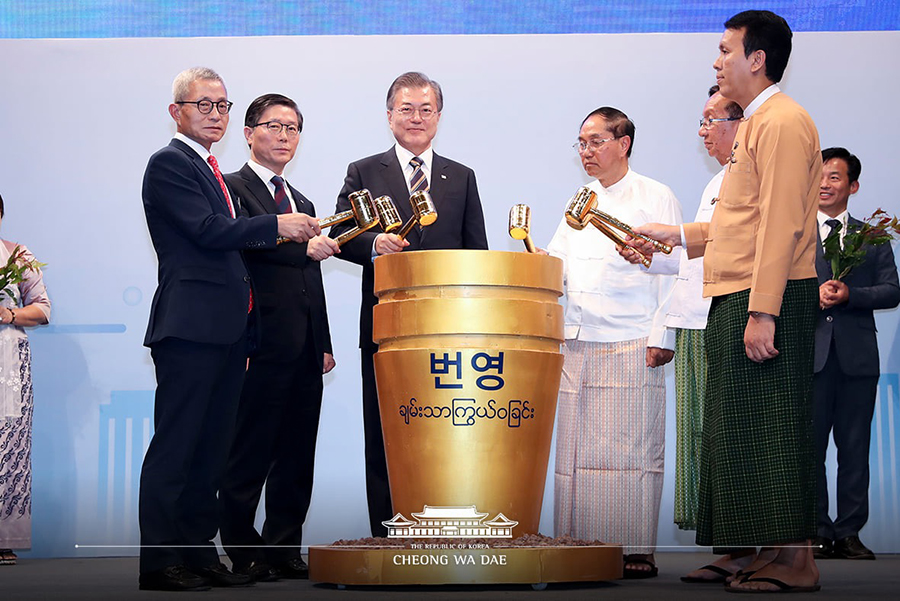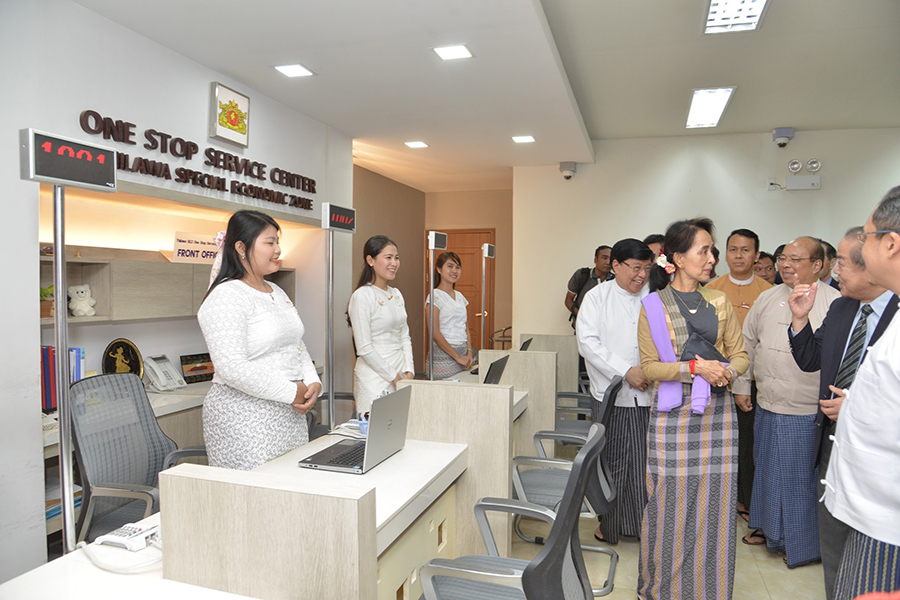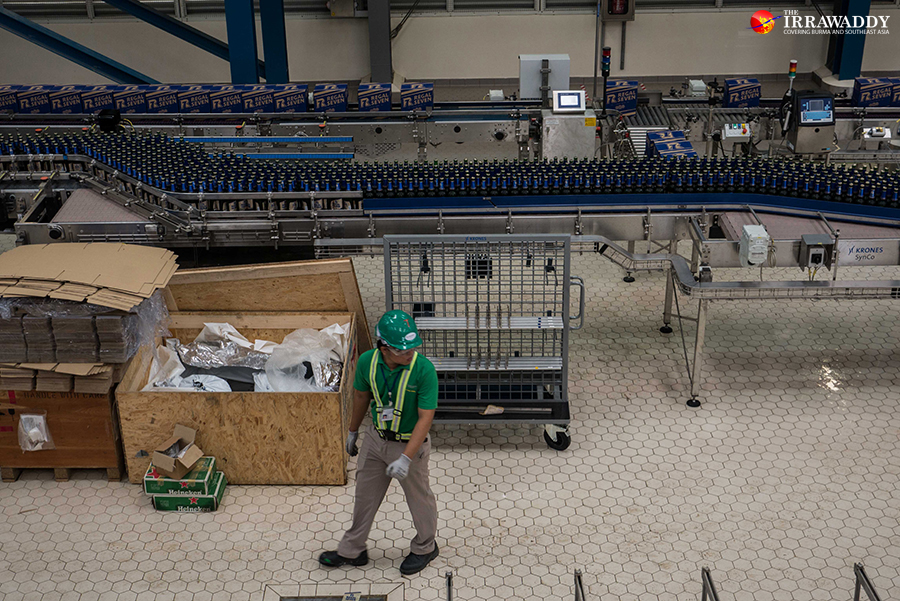YANGON—Since last year, Myanmar officials responsible for drumming up foreign investment have been shuttling between Naypyitaw and Asian countries to pitch the government’s latest legal, procedural, and institutional reforms to potential investors as part of efforts to revitalize the country’s economy.
State Counselor Daw Aung San Suu Kyi often highlights foreign direct investment (FDI) as a key driver of Myanmar’s economy.
Starting last year, both abroad and at home, Myanmar has held investment and business forums with Japan, South Korea, China, Malaysia, Thailand, Hong Kong and Singapore among Asian countries, and the US, UK, Czech, Hungary and Australia among Western nations.
Between January and September this year, the government organized a Union-level investment summit in Naypyitaw and four major investment forums in Yangon and Mandalay regions, and in Rakhine and Chin states, inviting both local and foreign investors to attend. This is part of the government’s investment promotion plan, which has emphasized East Asian countries since the country’s image took a battering in the wake of the 2017 Rohingya crisis in Rakhine State, which turned off Western investors.
All of the forums were attended by either State Counselor Daw Aung San Suu Kyi or Union Minister for Investment and Foreign Economic Relations U Thaung Tun. They have touted the country’s business opportunities, and tried to entice investors with the prospect of getting an early foothold in Southeast Asia’s “Final, Best Frontier.”
According to U Thaung Tun, the government’s focus this year is on expanding investment and accelerating the opening up of the economy, which it hopes will take “a quantum leap”.
In August alone, the government hosted three business forums with Japan, the US, Thailand and Malaysia.
Most recently, the two-day Myanmar Global Investment Forum, sponsored by UK aid through the DaNa Facility and the Myanmar Investment Commission (MIC), kicked off in Naypyitaw on Sept. 10. On the same day, the director general of the Myanmar government’s investment agency, the Directorate of Investment and Company Administration (DICA), was luring potential investors at the Myanmar Investment Promotion Seminar in Hong Kong.
With the welcome mat well and truly rolled out for foreign investors, both at home and abroad, we are clearly in a key period for investment promotion this year, as U Aung Naing Oo, the permanent secretary at the Ministry for Investment and Foreign Economic Relations (MIFER) put it.
The NLD government established MIFER in November 2018 to handle foreign economic relations, boost local and international investment and ensure that such investment is socially and environmentally responsible.
“We officials are going abroad to promote what we have done [in terms of reform]. At the same time, we are launching investment fairs and forums at the state and regional levels,” U Aung Naing Oo said.
The investment promotion plan envisions two types of promotion efforts: going abroad to provide updated information, while building networks to help foreign investors; and collaborating with target countries’ chambers of commerce inside Myanmar to create networks at the Union and state/regional levels for businesses willing to invest in Myanmar.

Ongoing reforms
Meanwhile, the NLD government is in the midst of a series of ambitious liberalization measures intended to open up new sectors to foreign competition and regional collaboration, making Myanmar an attractive destination for FDI going forward.
For the first two years of its administration, which began in 2016, the NLD was distracted by the deadlocked peace process. Later, it shifted its attention to economic reforms. Alarmed by a significant decline in foreign investment from 2017, government officials at the Union and state/regional levels started intensively seeking foreign investment.
Since taking office in 2016, the NLD government has implemented numerous economic reforms, including: amending new investment laws and introducing a Myanmar Companies Law to boost confidence among foreign investors; creating the new ministry; and drawing up the Myanmar Sustainable Development Plan (MSDP), a road map to promote equal development in social and economic sectors.
“Step-by-step, we have introduced the new company law and other legal procedures. At the same time, we have simplified the rules and regulations to make the county friendlier to investors,” said U Aung Naing Oo, who served as the director general at DICA until March this year.
The government has also set up an online registration system for local and foreign companies, to remove red tape. Additionally, it introduced the Myanmar Investment Promotion Plan (MIPP), which aims to attract more than US$200 billion (305.7 trillion kyats) in investment from responsible businesses over the next 20 years. MIPP projects are expected to receive US$8.5 billion from fiscal 2021-22 to 2025-26; US$12.3 billion from 2026-27 to 2030-31; and US$17.6 billion from 2031-32 to 2035-36.
The Project Bank has been set up as a centralized and publicly accessible database to enable the government to coordinate with ministries and departments and prioritize proposals that are in line with the MSDP.
The second step in the reform plan is the decentralization of authority to state and regional investment commissions to grant permission for investment projects of up to US$5 million. In the past, only the MIC had this authority. Moreover, the government has decided to open state and regional investment committees and offices to oversee investment procedures.
“We conducted a capacity-building development program for them,” U Aung Naing Oo said.
The third phase of reform centers on facilitation. To this end, the MIC has approved the creation of one-stop services for investors.
Another route for promoting FDI is the NLD government’s “globalization” policy, under which it plans to open some major sectors of the economy to foreign investors. Last year in May, the Ministry of Commerce gave the green light for foreign firms to operate businesses with 100-percent foreign ownership to provide wholesale and retail services in Myanmar. Previously, Myanmar laws protected local firms in this sector.
Last November, the Central Bank of Myanmar allowed foreign banks to provide import financing and to extend loans to local companies and provide other banking services, opening up a new source of funding to local corporates. Previously, international branches were only allowed to finance foreign companies operating in Myanmar.
Currently, branches of 13 international banks from China, Japan, Singapore, India, Malaysia and Vietnam are listed with the central bank, while 49 other banks have representative offices here.
A rocky few years
Economic reform is one of the key goals of Daw Aung San Suu Kyi’s government as it looks to complete Myanmar’s democratic transition after almost six decades of isolation under military dictatorship.
After the 2015 election that brought the NLD to power, many people speculated that foreign investment would flood into Myanmar, attracted by the presence of its first democratic government for more than five decades.
But these hopes were derailed by the Rohingya crisis, which has led to a rocky couple of years for the NLD government.
FDI in Myanmar declined significantly from US$9.5 billion in fiscal 2015-2016 to US$6.6 billion in 2016-2017 and US$5.6 billion in 2017-18—its lowest level since 2013.
Sean Turnell, a special economic consultant to the Myanmar State Counselor, admitted last year that the Rakhine crisis remains a significant hurdle for the NLD government’s economic reform effort, as it is scaring off tourists and investors, especially from the West.
“The impact is huge… a huge direct impact,” he said at a seminar in Yangon.
U Aung Naing Oo said one of the biggest challenges facing the government is the EU’s decision to hold off on signing a bilateral trade protection agreement, after negotiations had reached the final stage.
“The EU suspended [the signing] due to the Rakhine case. I had hoped that by signing it we could expect more investment from EU countries.”
“All of our efforts became worthless,” he said.
Since October, when the government officially unveiled its “Look East” policy, officials have toured Asia beating the drum for the country’s economy.
Seeking to spur new investment, officials from Daw Aung San Suu Kyi herself to the staff of investment-related agencies have been touting Myanmar’s strategic location in Southeast Asia, recent infrastructure development and emerging workforce.
In late August, the government hosted business forums with Thailand and Malaysia. Addressing potential investors in Thailand—already the third-largest source of foreign investment in Myanmar, the State Counselor said in her video message to the Myanmar Insight 2019 forum in Bangkok that “The changes are now contributing to an increased flow of foreign investment into Myanmar”.
Daw Aung San Suu Kyi was not overstating the case.
Last month, Japan and the US issued an unprecedented joint statement saying they would stand with Myanmar to promote responsible, quality and ethical investment “for the benefit of the people of Myanmar” and “for the country’s economic development.” US companies currently investing in Myanmar include Coca-Cola, Ford and Avis.
Recently, South Korea and Myanmar officially announced the establishment of a US$110-million industrial complex in Yangon. Nearly 200 Korean companies are expected to invest in the production facilities, which will generate a projected US$10 million in taxes annually.

A total of over US$1.6 billion had flowed into the Japan-backed Thilawa Special Economic Zone (SEZ) as of April. Daw Aung San Suu Kyi has often praised the project as a crowning success that highlights the benefits of positive partnership.
As a part of Chinese President Xi Jinping’s ambitious Belt and Road Initiative (BRI), China has been negotiating with Myanmar to implement nine mega-projects in Myanmar including the Kyaukphyu SEZ, the Muse-Mandalay railway project and border economic cooperation zones in Kachin and Shan states.
The Myanmar government last week announced that approved FDI into the country stood at US$4.1 billion in the current fiscal year, a nearly 70-percent increase from the same period last year. However, the number was short of the government’s target of US$5.8 billion.
Although China, South Korea and Japan have committed to more than a dozen large infrastructure projects in Myanmar under the NLD government, most of them still exist only on paper. Some are in the feasibility assessment stage, some are undergoing environmental impact assessments (EIAs) and others are under review by experts.

Favorable destination?
The ongoing major reforms have stimulated significant discussion within the business community as to whether Myanmar has in fact become a favorable country for investors in the region.
In the World Bank’s latest Ease of Doing Business Index (2019), Myanmar showed no improvement in its overall ranking, retaining the No. 171 spot it held last year—and remaining the least favorable ASEAN member country in which to conduct business.
The government has set a goal of reaching the index’s top 100 by 2020, and has formed a task force to achieve the goal.
Despite the positive talk from the government, however, the business community remains troubled by delays in investment and project approvals, lack of infrastructure and unclear investment rules and regulations, all of which remain barriers to FDI in reality.
U Di Thar Myint, the managing director of Precious Link Co. Ltd, told The Irrawaddy that despite the government’s moves to improve the investment and business environment, businesses continue to face delays in the investment process on the ground.
Complaints such as, “There’s still too much paperwork,” “We’re stuck in unnecessary procedures,” and “There’s a lack of clear procedures for investment” remain common, he said.
U Di Thar Myint, who has been working on an infrastructure project outside Yangon, said the project has been delayed by about three months as his company waits for a construction permit.
“We keep asking when the project can start, but no one can tell us,” he said. “The worst part is that investors have no idea which stage they are at during the process.”
“The Union government said it has adjusted its procedures to make them clear and effective, but I don’t think it really applies at the regional level,” he added.
U Aung Naing Oo admitted that weak cooperation between government departments is still a challenge for the government. Moreover, hierarchical and bureaucratic processes within government departments are another serious obstacle to reform.
“We are trying to change conditions that are deeply rooted,” he said.
According to a report by Global Infrastructure Outlook, Myanmar’s positive economic trajectory will be challenged by its massive infrastructure needs. Among the 50 nations covered in the report, Myanmar ranked last, with an infrastructure shortfall valued at an estimated US$112 billion.
Hlaing Thar Yar Industrial Zone chair U Myat Thinn Aung told The Irrawaddy that Myanmar’s two biggest problems when it comes to attracting investors are infrastructure and the Rakhine crisis.

“Infrastructure is the biggest obstacle to attracting investors,” he said.
He said foreigners are investing in the textiles sector, but are less interested in the heavy industrial sector due to infrastructure problems, particularly electricity.
Myanmar, which already has Southeast Asia’s lowest rate of access to electricity, faces regular power blackouts in the dry season due to water shortages at hydropower plants. Hydropower remains Myanmar’s main source of electricity, followed by natural gas and coal.
According to the Ministry of Electricity and Energy (MOEE), the country faced a 400 MW power shortage as of April. This is expected to rise to 1,588 MW by 2020. The government recently promised it would buy electricity from China to fill the gap.
U Myat Thin Aung said, “Whenever investors come, they are repelled by the cost of developing infrastructure, especially electricity [costs].”
“The other problem is the Rakhine crisis. This is a political issue that the government needs to resolve,” he said.
Upcoming reforms
Meanwhile, the Ministry of Planning and Finance and MIFER have been developing a new Standard Operation Procedures (SOPs) policy that aims to simplify the investment process and the granting of business-related approvals.
Moreover, the Myanmar government is working on two major reforms. The first is a single-window system that would facilitate trade to increase time and cost efficiency for traders in their dealings with government authorities while obtaining the relevant clearance and permits. The second is a land bank, a digital platform that aims to provide investors with information on how much government owned land is available, and also about land leases.
The government has offered assurances that the SOPs will have more transparency, reduce unnecessary procedures and create a level playing field for those who want to invest in Myanmar.
Internationally, most countries offer three main incentives to attract foreign investment: national incentives including investment procedure reforms; regulatory incentives to make rules and regulations easier for investors; and physical (infrastructure) incentives to provide essential infrastructure for businesses.
U Aung Naing Oo said, “We are making progress on both national incentives and regulatory incentives. But physical [infrastructure] incentives are still a challenge for us.”
Speaking about the damage done by the Rakhine issue, he said, “It needs time to heal. We can’t change others’ views overnight. We have to prove [ourselves] through work.”
“Based on the progress we have made so far, I am sure that our investment environment will improve in the near future,” he said.
On Wednesday, the last day of the Myanmar Global Investment Forum sponsored by UK aid in Naypyitaw, the UK Embassy said in a statement said that the UK is looking to form a long-term economic partnership with Myanmar for the countries’ mutual shared benefit. It said all its activities aim to promote the economic growth and welfare of people across Myanmar.
You may also like these stories:
Myanmar, South Korea Sign Major Agreements on Trade, Investment and Finance
South Korean President Enhances Bilateral Economic Ties with Myanmar
Foreign Investment in Myanmar Set to Miss Target: MIC
Korea-Myanmar Industrial Complex to Begin Construction This Year

















